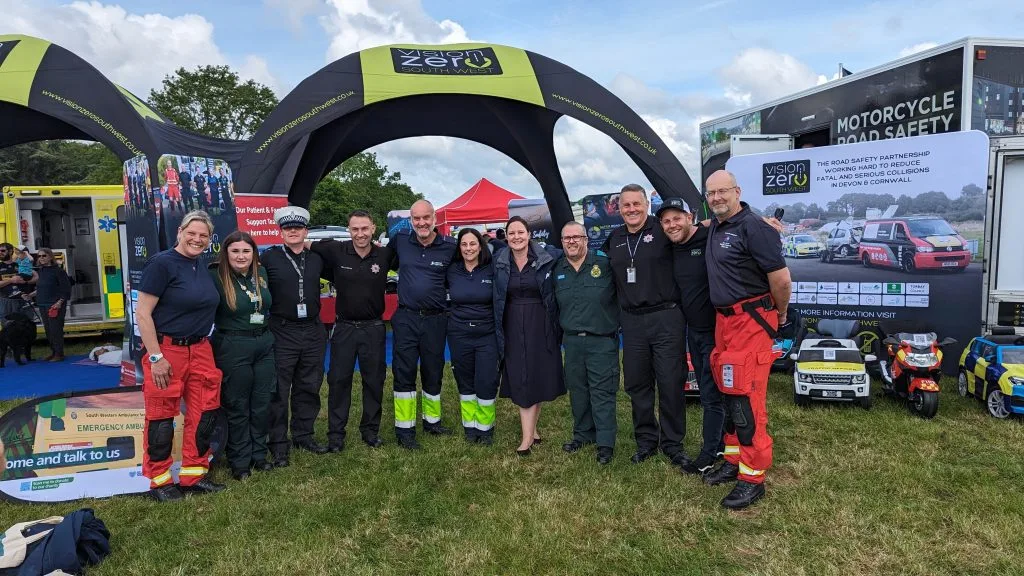In the role of Police and Crime Commissioner, you have to deal with a LOT of numbers. Costs, incidents, staff, demographics, injuries, priorities, percentages and an array of spreadsheets are par for the course in this job – and it can sometimes be hard to see the wood for the trees.
However, there are some numbers that really stick with you. One such set of figures are the annual KSI statistics which reveal the number of people who are killed or seriously injured as a result of collisions on our roads.
Last year, these figures revealed that 57 people died and a further 614 were seriously injured in Devon and Cornwall. Across the whole of Great Britain, the figure stands at a staggering 1,633 deaths and 27,904 serious injuries.
These aren’t just numbers; these are peoples loved ones and family members, parents, children, brothers, sisters, friends – lives turned upside down by unimaginable tragedy and hurt.
I often think that if this number of people were dying or being seriously hurt in any other way, there would be a national outcry with action demanded from all corners – and rightly so.
But for some reason, society seems to just accept the fact that crashes on our roads will happen and that people will die as a consequence. I can’t accept that.
The Vision Zero South West road safety partnership, which I helped form in 2019, collectively believes that one death on our roads is one too many. Together we are striving to reduce those numbers – initially by 50 per cent by 2030, but eventually to zero.
This week is National Road Safety Week, running from November 16 to 22, and the partnership is shining an extra bright light on some of the work it conducts tirelessly throughout the year.
This includes events such as Learn2Live – a fantastic and effective theatre-based education scheme which reaches thousands of learner drivers throughout the region every single year.
The partnership’s work also includes motorcycle training programmes to improve skills and perception, in-school child pedestrian schemes, and vital engagement with older motorists to help them drive safer for longer.
Our work includes enforcing safe speeds on our roads, conducting targeted operations to remove those who pose danger to us behind the wheel, and helpful messaging designed to keep us all as safe as possible. We even pioneer the use of advanced technologies such as AI cameras which detect seatbelt and mobile phone offences – and can even help spot drink and drug drivers.
But partnerships such as ours only have so much power. To make a real difference, we desperately need legislative support from central government in the form of a national road safety strategy, which will be the first in over a decade.
Collectively, the partnership has lobbied the government for a raft of simple but highly effective measures through our Road To Zero plan. This advocates things like lower drink-drive limits, increased funding for cycling and walking infrastructure, graduated licenses for new drivers and mandatory declarations of certain health conditions.
Needless to say, we eagerly await the government’s road safety strategy, but in the meantime, we continue to collaborate locally with schemes like our Lift Legend drink driving campaign which launches this week.
The scheme offers designated drivers free soft drinks at more than 260 pubs, clubs and restaurants across Devon and Cornwall throughout December. Consider it a thank you for getting your friends, family and colleagues’ home safely.
Sadly, more than 2,000 arrests were made for drink-driving in Devon and Cornwall last year, which shows there are still a lot of people out there who simply don’t understand the terrible consequences this selfish action can have.
If being involved in a serious collision is not enough of a deterrent for would-be drink-drivers, think of the consequences if you are convicted. You can expect an automatic one-year driving ban, penalty points on your license, a hefty fine and a criminal record.
If you drive for work, you could lose your job and your livelihood, and your insurance premiums will almost certainly shoot up. It’s just not worth it. Don’t take the risk.
For more information about Lift Legend – and to find your local participating venues – visit: Lift Legend: Free soft drinks for designated drivers this Christmas – vision-zero
As well as Lift Legend, my office has also helped fund a series of Night Bus services throughout the region, offering revellers a safe and cheap way to get home. The buses run every Saturday night – as well as ‘Factory Friday’ and New Years Eve – and cover locations around Exeter, Plymouth, Torbay and North Devon. For more details visit Devon & Cornwall Police’s Night Bus webpage.
Throughout December, Devon & Cornwall Police are conducting Operation Limit, which sees increased patrols targeting drink and drug-driving throughout the region. Last year, 178 people were arrested on suspicion of drink-driving during the Op Limit period.
If you suspect someone of drink or drug driving, call 999 immediately if the driver is an immediate danger. If it’s not an emergency, dial 101 for the police or report it anonymously to Crimestoppers on 0800 555 111 or via their website. You can also use the Devon & Cornwall Police online reporting tool for non-urgent matters.
No matter where you live, no matter which mode of transport you use – road safety affects every single one of us. It has to be a shared responsibility, and everyone needs to play their part.
This is just one example of the important work that could be lost with the abolition of my role that was announced last week.

